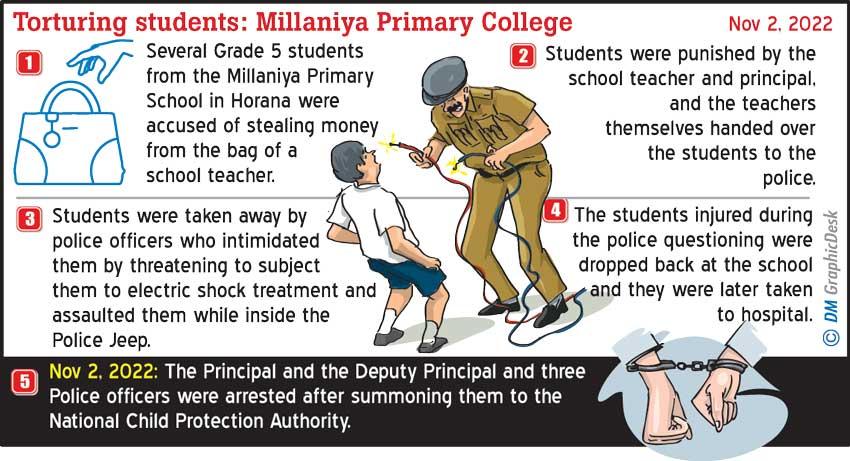10 Nov 2022 - {{hitsCtrl.values.hits}}

Alleged torture by the Police
Investigations launched
 Corporal punishment in schools is often perceived as an effective way to discipline children, but such cruel approaches have many detrimental impacts on the physical and psychological well-being of a child.
Corporal punishment in schools is often perceived as an effective way to discipline children, but such cruel approaches have many detrimental impacts on the physical and psychological well-being of a child.
In fact, corporal punishment has no limits and it could be anything from a beating with the hand to using a cane, wooden rod or any other harmful tool.
Sri Lankans have become numb to incidents of abuse against women and children to the extent that they are no longer surprised to hear about these incidents when reported in the news. The most recent incident was reported from Millaniya, Horana where three Grade 5 students of Millaniya Primary School, who were punished by the school teachers accusing them of stealing a purse belonged to a teacher. Then they were handed over to the police who allegedly tortured them and used electric shocks on them while they were in the police vehicle.
The incident
|
Srilal Nonis |
|
Dr Tushara Wickramanayaka |
The incident was reported on November 6 and according to media reports, several Grade 5 students of Millaniya Primary School, Horana were accused of stealing money from a teacher’s handbag and the teachers and the Principal punished the children thereafter.
Later on, the teachers handed the students to the local Police. Two children speaking to the news channels alleged that the Police tortured them using electric shocks while on the way to the Police Station, threatening them to reveal the truth.
Thereafter the boys were dropped back at school. One child who spoke to the media claimed that one of them had suffered wounds following the torture and had been admitted to hospital.
Investigations launched
In his comments to the media, National Child Protection Authority (NCPA) Chairman Udayakumara Amarasinghe said that the Judicial Medical Officer has confirmed that the students have been tortured. As such this is a serious offence as per the law in Sri Lanka. In addition, the Police officers and teachers in question have been summoned by the NCPA to record statements. They were produced in court on November 8.
“The vehicle that transported the children has been seized by the NCPA as evidence and an investigation has been launched to check whether there was equipment inside the vehicle to give electric shocks to people inside the vehicle,” Amarasinghe said speaking to the Daily Mirror.
“The NCPA is already conducting preventive education programmes and school-based child protection committees too have been established,” he said.
Responding to a query on the reasons as to why teachers punished students, Amarasinghe said that most teachers say ‘Lamai hadaganna thamai gahanne’ (we hit students to discipline them).
“But from a personal point of view, it looks like teachers are going through stress and they are overwhelmed with work and are working under pressure. Therefore we hope that the Education Ministry officials will intervene in this matter and take necessary action.”
Two children speaking to the news channels alleged that the Police tortured them using electric shocks while on the way to the Police Station, threatening them to reveal the truth
|
Udayakumara Amarasinghe - NCPA Chairman |
When contacted, Western Province Education Director Srilal Nonis said that the Ministry had also launched an investigation on November 8 and that necessary action would be taken based on the report.
“We have been conducting awareness programmes for teachers on how to discipline students and such a programme was recently conducted in Horana. But unfortunately, this incident was reported. We don’t encourage corporal punishment in schools since it has been banned but one or two incidents are still being reported.”
A separate investigation is being conducted by the Police on the alleged conduct of the Police Officers.
“The Police Special Investigation Unit has launched an investigation into the incident. Normally there is no such equipment to give electric shocks to people in our vehicles. The vehicle only has a battery. Therefore we want to further investigate this matter. Right now the said vehicle has been seized by the NCPA,” said Police Media Spokesperson SSP Nihal Thalduwa.
Three Police officers, the school Principal and a teacher who was arrested by the NCPA were later produced before the Colombo Magistrate’s Court and were remanded until November 16.
In the meantime, the Principal has been suspended from work.
It has become customary to allow persons accused of offences to remain in direct contact with children putting them at greater risk due to bureaucratic lethargy
Banning corporal punishment in schools; The only way forward
The Stop Child Cruelty Trust was initiated with the objective of ending corporal punishment in Sri Lanka. Several of its programmes including the ‘Thahanam Wachanaya Danduwama’ (Ban the word Punishment) and the ‘#Nohit Zone – Happier and Safer Education Programme’ aims at supporting teachers to adopt alternative positive discipline methods.
Commenting on the recent incident in Horana, Stop Child Cruelty Trust Chairperson Dr Tushara Wickramanayaka strongly urged authorities to suspend the teachers and Police officers immediately, until the inquiries are concluded as they do in some advanced societies.
It has become customary to allow persons accused of offences to remain in direct contact with children putting them at greater risk due to bureaucratic lethargy.
“Sri Lanka is not a country that prevents terrorism; It breeds terrorism! When we visited a primary school in Batticaloa last week during the ‘Child Protection Tour’. We were shocked to see three weapons in the Principal’s office: a cane, a bamboo stick and a large wooden pole. All children were below 11 years of age. The Principal claimed it was to instil fear in the little ones. Isn’t this the same objective of a terrorist?” she questioned.
“From Kindergarten to University and beyond, citizens are suppressed and oppressed by a chain of command that trickles down the power structure. Children are beaten to death in the guise of discipline by parents, they are being educated not with wisdom but with weapons of destruction using canes in schools and religious institutions and they are being beaten by Officers of State institutions, including the Police by batons and electric wires. This is TORTURE.
“Terrorism is not cultured by religious extremists or ethnocentric fanatics in this paradise, it is nurtured by an archaic value system in society that is endorsed by the State that lacks visionary leadership.”
“In the landmark decision given by the Supreme Court of Sri Lanka in June 2019, Case Ref SC (FR) No. 677/2012 where Police Officer of Matara, Waruni Bogahawatte was found guilty of violating the Human Rights of a child, the Court stressed that law enforcement authorities must adhere to 20 point guidelines that were introduced to prevent the abuse of power. Despite these clear indicators from the Supreme Court, Sri Lanka Police are continually seen to violate the law of the land mocking the judiciary process.”
“I urge the Minister of Education to implement the SC case No SC/FR/97/2017 of February 2021 and Circular no 12/2016, both banning corporal punishment in schools, conducting large-scale training on child psychology and positive discipline and offering counselling services for teachers. I also urge the Inspector General of Police to conduct urgent training for all Police Officers and commence reforms to the ancient Police Ordinance Act to endorse a higher code of ethical conduct. We are also hopeful that the Ministry of Education will provide its fullest support to Stop Child Cruelty Trust to implement the proposed ‘#NOhit zone Happier and Safer Education Schools Programme’,” she added.
However, on the contrary, Sri Lanka expressed its commitment to prohibiting all corporal punishment of children, including in the home, at the July 2006 meeting of the South Asia Forum, following the 2005 regional consultation of the UN Study on Violence against Children.
This commitment was reiterated during the Universal Periodic Review of Sri Lanka in 2017, during which Sri Lanka clearly accepted a recommendation to prohibit corporal punishment in all settings. Sri Lanka is a Pathfinder country with the Global Partnership to End Violence Against Children, which was established in 2016.
25 Nov 2024 1 hours ago
25 Nov 2024 2 hours ago
25 Nov 2024 2 hours ago
25 Nov 2024 2 hours ago
25 Nov 2024 3 hours ago